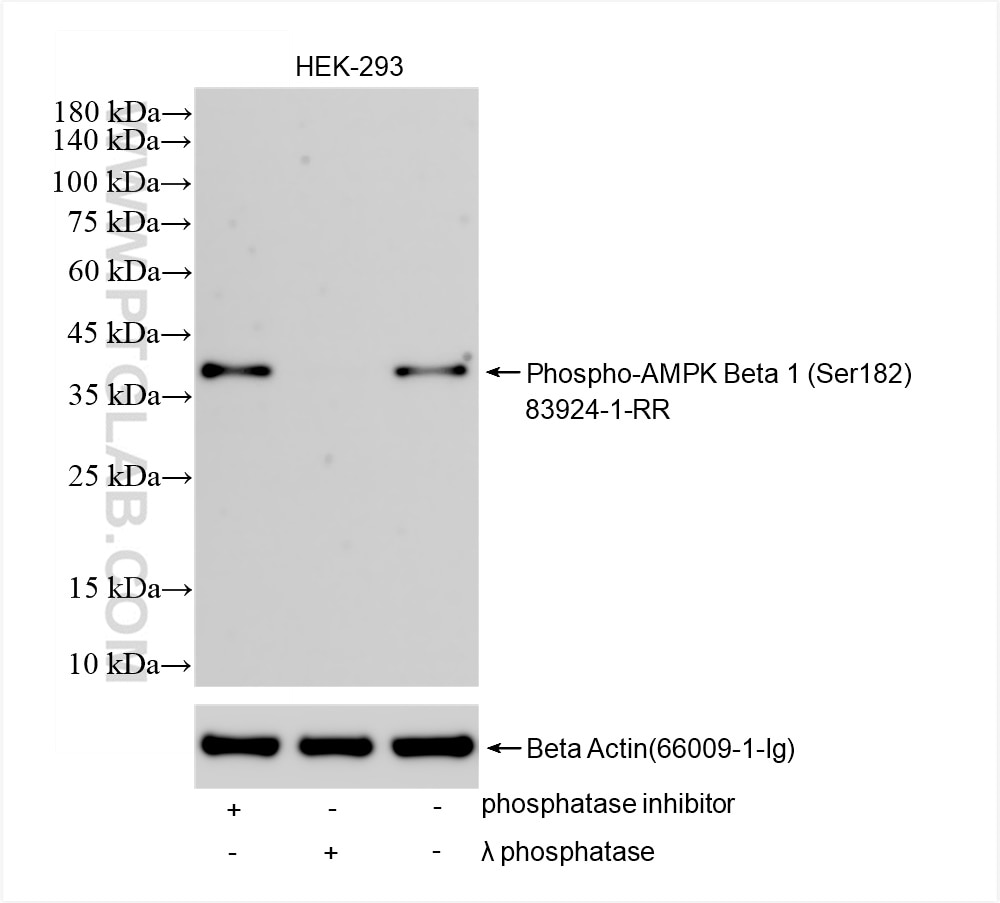Phospho-AMPK Beta 1 (Ser182) Rekombinanter Antikörper
Phospho-AMPK Beta 1 (Ser182) Rekombinant Antikörper für WB, ELISA
Wirt / Isotyp
Kaninchen / IgG
Getestete Reaktivität
human und mehr (3)
Anwendung
WB, ELISA
Konjugation
Unkonjugiert
CloneNo.
240628B1
Kat-Nr. : 83924-1-RR
Synonyme
Geprüfte Anwendungen
| Erfolgreiche Detektion in WB | HEK-293-Zellen, λ phosphatase treated HEK-293 cells |
Empfohlene Verdünnung
| Anwendung | Verdünnung |
|---|---|
| Western Blot (WB) | WB : 1:500-1:1000 |
| It is recommended that this reagent should be titrated in each testing system to obtain optimal results. | |
| Sample-dependent, check data in validation data gallery | |
Veröffentlichte Anwendungen
| WB | See 11 publications below |
Produktinformation
83924-1-RR bindet in WB, ELISA Phospho-AMPK Beta 1 (Ser182) und zeigt Reaktivität mit human
| Getestete Reaktivität | human |
| In Publikationen genannte Reaktivität | human, Hausschwein, Maus, Ratte |
| Wirt / Isotyp | Kaninchen / IgG |
| Klonalität | Rekombinant |
| Typ | Antikörper |
| Immunogen | Peptid |
| Vollständiger Name | protein kinase, AMP-activated, beta 1 non-catalytic subunit |
| Berechnetes Molekulargewicht | 38 kDa |
| Beobachtetes Molekulargewicht | 38 kDa |
| GenBank-Zugangsnummer | BC001007 |
| Gene symbol | PRKAB1 |
| Gene ID (NCBI) | 5564 |
| Konjugation | Unkonjugiert |
| Form | Liquid |
| Reinigungsmethode | Protein A purfication |
| Lagerungspuffer | PBS with 0.02% sodium azide and 50% glycerol |
| Lagerungsbedingungen | Bei -20°C lagern. Nach dem Versand ein Jahr lang stabil Aliquotieren ist bei -20oC Lagerung nicht notwendig. 20ul Größen enthalten 0,1% BSA. |
Hintergrundinformationen
AMPK Beta 1 (5'-AMP-activated protein kinase subunit beta-1) is also named as PRKAB1 and AMPK. AMPK, a serine/threonine kinase that exists as a heterotrimer comprised of a catalytic α-subunit and regulatory β- and γ-subunits, has been recognized as a sensor of cellular energy homeostasis (PMID: 21937710). AMPK regulates key metabolic enzymes, cell growth, apoptosis, gene transcription, and protein synthesis (PMID: 12829246). AMPK is an energy sensor and plays an essential role in the control of cellular bioenergetics by responding to various stresses including those that induce changes in the cellular AMP:ATP ratio or modulation in intracellular calcium (PMID: 27812976, PMID: 26616193). Recent studies have shown that AMPK mediates the inhibition of cell proliferation and growth of tumor cells (PMID: 16613876). AMPK also inhibits the expression of Glut1 and glycolysis in Tregs by inhibiting mTORC1 signaling (PMID: 25477880). This antibody recognizes phosphorylated AMPK Beta 1.
Protokolle
| PRODUKTSPEZIFISCHE PROTOKOLLE | |
|---|---|
| WB protocol for Phospho-AMPK Beta 1 (Ser182) antibody 83924-1-RR | Protokoll herunterladen |
| STANDARD-PROTOKOLLE | |
|---|---|
| Klicken Sie hier, um unsere Standardprotokolle anzuzeigen |
Publikationen
| Species | Application | Title |
|---|---|---|
Front Nutr Luteolin attenuates LPS-induced damage in IPEC-J2 cells by enhancing mitophagy via AMPK signaling pathway activation | ||
Anal Cell Pathol (Amst) Shikonin Induces Autophagy and Apoptosis in Esophageal Cancer EC9706 Cells by Regulating the AMPK/mTOR/ULK Axis | ||
Cell Signal Targeted therapy for KIF3C: A study on the mechanism of combined therapy with KIF3C signaling pathway, afatinib, and MT-DC (ac)phosphoramide in regulating gastric cancer cell proliferation | ||
Nutrients Protective Effects of Isostrictiniin Against High-Fat, High-Sugar Diet-Induced Steatosis in MASLD Mice via Regulation of the AMPK/SREBP-1c/ACC Pathway | ||
Biomaterials Selective and iron-independent ferroptosis in cancer cells induced by manipulation of mitochondrial fatty acid oxidation | ||
Diabetes Metab J Shionone Inhibits Glomerular Fibirosis by Suppressing NLRP3 Related Inflammasome though SESN2-NRF2/ HO-1 Pathway |


